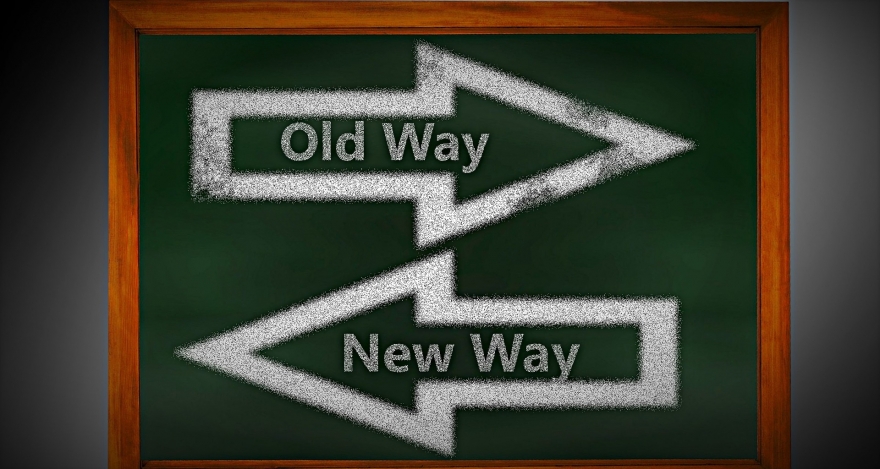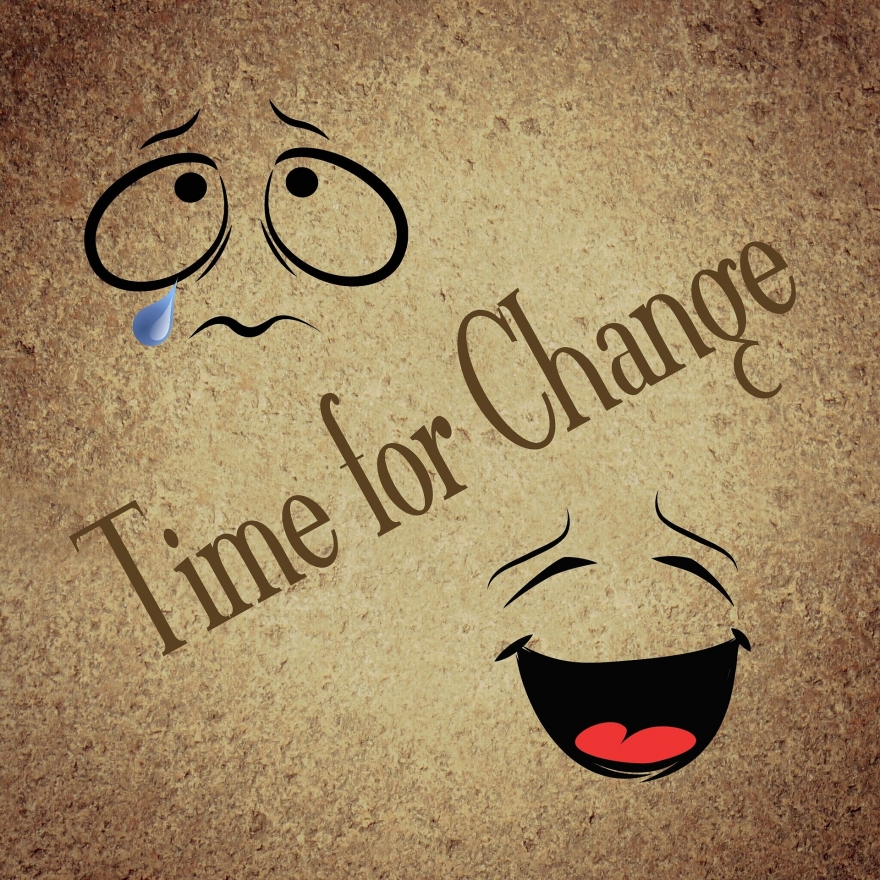Monthly Featured Article (February 2018)
Introduction <
Chapter 2 - The Power of Change >
Chapter 3 - How to Embrace New Beginnings >
Coming in May... Chapter 4 - Enjoy Your New Beginnings >
Making A Fresh Start: Embracing New Beginnings
Chapter 1 - The Fear of Change
by Susie J. Briscoe

There are certain times of the year when people are most concentrated on making changes in their lives. New Year, birthdays, wedding days, graduation, and other special days which tend to make us think about our future and what we could do to improve it.
Change can be both titillating and fearful. You might find it exciting to think about changing jobs to further your career or completely begin a new one. But, you might also fear the unknown and begin to experience negative thoughts such as, “What if I can’t do it?,” “A new job will interrupt my routine,” and “What if I don’t like my coworkers or boss?”
Fear of change is fear of the unknown, but if you can get past the fears and focus on how certain changes can serve to make your life the best it can be, you’ll enter those life changes with positivity and enthusiasm.
What is Change - And Why Do We Fear It?
You can’t create new beginnings in your life without change. The definition of change is that you’re modifying your surroundings, condition, or situation in some way that is different from the present.
You likely have a preconceived notion of how your life and everything around it must work. When something happens that threatens to change that preconception, you may feel anxiety or stress.
Changes occur all through your life – puberty, school and job changes, relationship changes, and then the inevitable changes that come with old age. Sometimes you may deliberately make changes to better yourself.
You’ve likely categorized the changes that have occurred in your life as either “positive” or “negative” – good or bad. When you come across change that doesn’t fit your picture of what life should be, stress and anxiety are sure to occur.
Even good things like a vacation or a move to a newer and better home or a better job can cause you to fear the changes – even though they’re positive in nature.
The reasons you fear change are varied and often depend on the conditions of the change, your mood at the time, and how your life might be affected. For example, a simple change in your life might occur when you drive to work on your usual path and encounter a detour along the way. It might be an inconvenient change, but it’s not likely to be a major stress factor.
But, a child leaving for college might cause stress and anxiety that could last a long time. It’s a change that will highly affect your life and surroundings and you don’t know how life will be after the upheaval.
 Another reason you may fear change is lack of information. You may have developed information about certain changes through your childhood experiences, but may have no information whatsoever about how some of these experiences will play out in your life.
Another reason you may fear change is lack of information. You may have developed information about certain changes through your childhood experiences, but may have no information whatsoever about how some of these experiences will play out in your life.
If your adult experiences with certain changes are different from your childhood experiences with the same type of changes, you may have difficulty getting past pre-formed knowledge and forming new opinions.
As an adult, there are certain fears that are common barriers to positive changes in your life. Read on to discover the 10 top fears that may play a role in preventing you from moving on with your life.
10 Top Fears That Prevent Us From Change
Some fears are so difficult to overcome that it may be difficult to move past them without angst and frustration. It’s normal to be uneasy or skittish about change, but when it goes so far as to prevent you from taking chances on a better life or relationship, it’s time to seek balance.
It helps to know that you’re not alone with your fear of change. Here are some fears that almost surely will cause you to suffer anxiety and frustration:
- Failure - Fear of failure is one of the top fears that people list as keeping them from projecting and feeling the confidence they need to move on with their lives. It’s a normal fear to have – but also one that you must overcome to live your life to the fullest.
- Rejection – No one wants to face the possibility of rejection, either from another human being or rejection from a job or college you applied for or any other type of rejection. But, rejection is one fear that’s sure to happen at least once in your life. Learning to get past the pain of rejection and do it anyway is imperative to meeting challenges.
- Loneliness – Fear of loneliness can cause people to stay in a bad or abusive relationship or make bad decisions just to have someone in their lives. Loneliness can be a major problem with seniors because they may feel isolated and unable to interact with others as they once did.
- Worthiness – Lack of self-esteem and self-worth can cause feelings of inadequacy to perform a service or make a change in your life. Thoughts that you can’t measure up to others may cause you to pass on a promotion or to hinder you from becoming a leader.
- Unknown – Many people won’t try something new because of the fear that it won’t work or they won’t like the outcome. Many people use fear of the unknown to hesitate or become lazy to try something different in their lives.
- Fear of Change – When you fear change in your life, you can sabotage every aspect of your life, including dreams for the future, relationships, and your career. You may dig in your heels and resist change to the point that you become immobile and miss out on many great opportunities that come your way.
- Disappointment – Remember how deflated you felt when you disappointed your parents, teachers, or some significant other in your life? We may also fear disappointing ourselves. The fact that we might regret the changes we deliberately make is a big reason that we resist change.
- Success – We want success – but also fear it. We think that we may not be able to handle all the things that go with success – money, fame, failing after the success, and the idea that we may not be worthy of the success. Rather than the fear of success, it may be all the things that come after the success that we most fear.
- Criticism – Being ridiculed or mocked about our ideas and goals can be a major fear, especially to those who suffer from low self-esteem. Stage fright is a form of the fear of criticism. We experience anxiety when we must address an audience because there’s a chance we might perform poorly and be ridiculed.
- Wasted Time – What if we spend days, weeks, or years learning or perfecting a skill – and the idea doesn’t work or we hate the chosen path? That’s time wasted when we could have spent it on something we already know. That’s why people multi-task today. They don’t want to take a chance on wasting time, so try to do many things at once.
Many of our fears are real, but some are figments of our imagination that comes from needless worry and lots of negative self-talk. We may welcome many changes, but be scared to death of others.
Changing jobs or careers, moving to a new city or town, marriage, graduation from college, or a promotion can all be viewed as happy times in our lives, but can also cause stress and anxiety. Whether it’s good or bad, change is something that sometimes comes with a sense of foreboding.
Reasons People Want to Change
Even though most of us have an innate fear of change, there are internal and external reasons why change is also a must. Some are so motivated to change that they accomplish great things that change the world.
Others change their own lives for the betterment of themselves or others. Whatever worthwhile changes you want to occur in your life, it’s good to know the possible reasons behind it so you may understand it better. Some possible reasons for change include:
 Positive internal feelings – Challenges, satisfaction, passion, and an internal self-validation occur when you make changes that are good for you. For example, if you lose weight, quit smoking, or finish college with a degree, you’re bound to experience positive internal feelings which should spur you on to even more positive changes.
Positive internal feelings – Challenges, satisfaction, passion, and an internal self-validation occur when you make changes that are good for you. For example, if you lose weight, quit smoking, or finish college with a degree, you’re bound to experience positive internal feelings which should spur you on to even more positive changes.- Positive external feelings – When you desire validation from others, positive changes are sure to make your family, co-workers, and others in your circle give you praise and compliments. This brings about good feelings and a desire to continue changes in your life.
- Negative internal feelings – Sometimes change is brought about because we fear failure and being labeled inadequate by others. There may also be threats involved from others, ultimatums that if you don’t change something bad will happen. This type of motivation isn’t good for change – even positive change – and you may find it difficult to maintain the changes you’ve made.
- Negative external feelings – You may be motivated to change because of external fears such as losing your job or a relationship or even paying the rent and other bills. Many fear the loss of respect from others if they don’t succeed.
The best reasons for change come from positive, internal feelings. Those are the types which begin with confidence and strength that you know you have to complete the challenges and make the changes.
Be sure to evaluate which of the above reasons motivate you to change. If they don’t come from the right place, you may want to re-evaluate your reasons to change and see if you can fit them into a place that will benefit you, both internally and externally.
Main Points of Chapter 1: The Fear of Change
Change is inevitable in your life. But most of us have a fear of certain changes because it can cause upheaval and challenges that we don’t know if we’re ready or capable of overcoming. Chapter 1: The Fear of Change begins to explore the nature of fear and help you understand why fear can paralyze you and keep you from experiencing the success you deserve.
Some of the main things you should have learned from Chapter 1 include:
- The definition of change is important for you to understand, because it can be both positive and negative. You learned about preconceived notions of change and how they affect you in the here and now.
- Fear of change may arise from changes that happened in your childhood or you may lack information about the changes happening (or about to happen) in your life.
- There are certain fears that most of us have in common preventing us from making positive changes.
- Fear of failure and fear of success are two common fears that seem to be opposite each other, but both may bring frustration and anxiety.
- If fear is keeping you from changing your life for the better, it’s time to seek balance that can help you overcome those fears.
- It’s also common to fear the unknown. Unless you gather information about changes which are about to occur in your life, you may experience fear.
- You may be fearful that you’ll disappoint yourself and others when you initiate changes in your life.
- Some fears of change are real and some simply figments of your imagination.
Next month, we look at The Power of Change in Chapter 2.
Don’t forget to share with me what you discovered during this month and let me know if I may share it within this newsletter next month.
